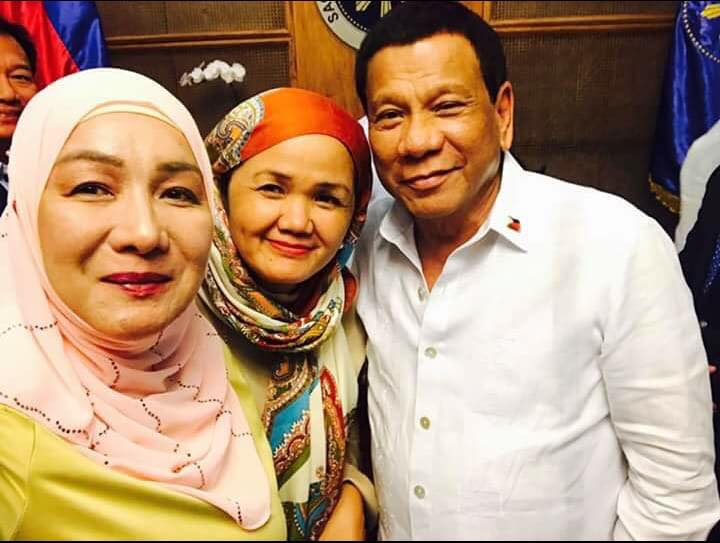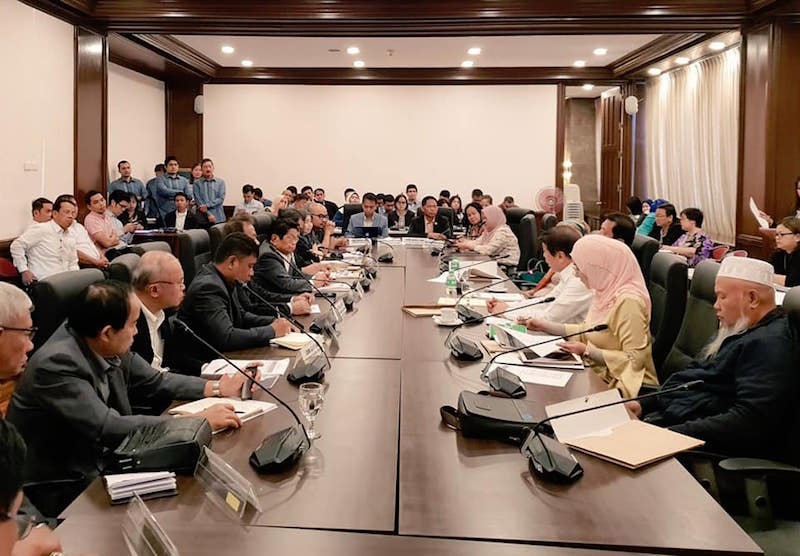The two houses of Congress will pass their respective versions of the Bangsamoro Basic Law (BBL) before adjourning sine die on Wednesday, May 30, following an assurance Monday night from President Rodrigo Duterte that he would certify the bill as urgent on Tuesday, May 29.
Duterte issued the certification, to “advance the creation of a new autonomous region in Muslim Mindanao” and while the passage of the BBL is now certain, what remains uncertain is what kind of Bangsamoro will come out of the two versions.
Congress leaders who met with President Duterte in Malacanang Monday night said a bicameral conference committee will resolve conflicting provisions in their bills so the President can sign it into law on July 23, the same day he delivers his third State of the Nation Address.
“It’s a great night for the Bangsamoro,” an ecstatic Tawi-tawi Rep. Ruby Sahali wrote on her Facebook page late Monday night. “Alhamdulillah Bangsamoro , PRRD (President Duterte) will certify (as) urgent BBL tomorrow, tawfiq reigns in the heart of the men and women who are true to the quest of the Bangsamoro,” said Sahali, chair of the House Committee on Peace, Reconciliation and Unity, which, along with the committees on Local Government and Muslim Affairs, tackled the BBL.
Maguindanao Rep. Bai Sandra Sema, Deputy Speaker for Mindanao, said “roller coaster ride but after meeting with President Digong, BBL will be certified as urgent.”
“It’s another historic moment in our quest for peace and closure of the Bangsamoro Problem. We take the challenges, hardships, sacrifices one day at a time. Inch by inch, small victories will pave the way to our goal. Not perfect but something to start with. Along this journey are men and women who made great contributions to the stage we have reached now,” she posted on FB.

Tawi-tawi Rep. Ruby Sahali and Maguindanao Rep. Bai Sandra Sema pose for a souvenir photo during the meeting in Malacanang of congressional leaders on 28 May 2018, on the Bangsamoro Basic Law. Photo from the FB post of Rep. Sema
House Majority Leader Rodolfo Farinas said the President “did not impose anything on Congress, but granted our request to certify the bill as urgent in order for the HOR and the Senate to pass their respective BBL bills on second and third readings before we adjourn on Wednesday.”
From the pronouncements of Sema, Sahali and Farinas, it appears that a major outcome of the meeting was the President’s certifying the bill as urgent, to do away with the three-day rule from the passage on second reading to the third reading.
Congress, however, did not need to request the President for certification. The Framework Agreement on the Bangsamoro signed by government and the Moro Islamic Liberation Front (MILF) in October 2012 provides that the draft BBL submitted by the Bangsamoro Transition Commission (BTC) “shall be certified as an urgent bill by the President.”
On Tuesday, Presidential Spokesperson Harry Roque, a former party-list Representative in the House, told a press briefing aired live from Bontoc, Mountain Province, that “di na kailangan ng (there is no need for) certification of urgency” because the versions are different.
Roque’s pronouncement caused confusion but under the rules in both houses, there is a three-day rule between passage on second and third reading, unless the bill is certified as urgent, in which case the second and third readings can be done on the same day.
In his certification, Duterte said the passage of the BBL is “a manifestation of the government’s commitment to address the diverse needs of the people in the Bangsamoro, and all communities and constituents of Mindanao, towards a just and lasting peace in Mindanao and in the Philippines as a whole.”
Signed into law on July 23
Farinas said the Bicameral Conference Committee will meet during the break (June 2 to July 22) to “resolve conflicting provisions of our bills in collaboration with the Executive Department and the BTC.” The 21-member BTC, composed of 11 members nominated by the MILF and 10 nominated by the government, drafted the BBL.
He said the report of the Bicameral Conference Committee will be submitted for ratification by the House and the Senate during their plenary sessions morning of July 23, for the President to sign in time for his third State of the Nation Address at 4 p.m. that day.
Presidential Adviser on the Peace Process Jesus Dureza said it was a “good meeting” with all leaders of the House and the Senate, “including their members who expressed strongly on their views on the bill.”
Dureza said Duterte “first met separately with different groups including the leaders of the MILF” led by chair Al Haj Murad Ebrahim, before convening separately the government sector.

Leaders of the House of Representatives meet with members of the Bangsamoro Transition Commission on May 28 to discuss proposed amendments to the BTC-drafted Bangsamoro Basic Law. Photo courtesy of Bangsmaoro Transition Commission
Roque said the President first met with the BTC, then the leaders of the House and Senate separately, and later, the two houses together.
Dureza noted that the President “initially expressed his own personal views and initial assessments which resonated well to all. The meeting adjourned with a general consensus that the two chambers conclude their work at the earliest possible time and if there are varying versions, that the mandated bicameral committees of both chambers meet to come up with a joint reconciled and accepted version.
Asked late Monday night what was the major issue resolved during the meeting, Dureza replied “the unanimous resolve to pass it.”
What kind of BBL?
But what kind of BBL will be passed?
Will it be in accordance with the Comprehensive Agreement on the Bangsamoro (CAB) that government and the MILF signed in March 2014 after 17 years of peace negotiations? Will it be more than the Autonomous Region in Muslim Mindanao (ARMM) that it seeks to replace? Will it address the historical injustices committed against the Bangsamoro?
The CAB provides for the creation of the Bangsamoro, a new autonomous political entity that will replace the 28-year old ARMM. Pursuant to the peace agreement, the purpose of the law, is to provide its “basic structure of government in recognition of the justness and legitimacy of the cause of the Bangsamoro people and their aspiration to chart their political future through a democratic process that will secure their identity and posterity and allow for meaningful self-governance.”
Last month, the three House Committees tackling the BBL in the House approved the omnibus motion to “retain as is” House Bill 6475 or the BTC-drafted BBL sponsored by Speaker Pantaleon Alvarez, Jr. and 90 other representatives, instead of voting on the 362 proposed amendments to the working draft that had consolidated the four Bangsamoro bills, among them the BTC draft.
The House leadership recently clustered the proposed amendments into nine: Plebiscite; Powers of Government; National Defense and Security, Public Order and Safety, and Coastguard Matters; Fiscal Autonomy; Territory; Bangsamoro Transition Authority; Bangsamoro Justice System; Eocnomy and Patrimony; and Basic Rights.
MindaNews sources who read the proposed amendments say a number of the proposals, if carried out, would render the future Bangsamoro less autonomous than the present ARMM. A number of the exclusive powers of the Bangsamoro, for example, is being transferred to the list under concurrent powers while other powers listed under “concurrent” are being added to the reserved powers of the national government.
At the Senate, interpellation on SB 1717, the substitute bill to SB 1646 or the BTC-drafted version, was “conditionally” terminated last week but senators with proposed amendments were allowed to interpellate.
On Tuesday, Senate President Pro Tempore Ralph Recto and Franklin Drilon did their interpellation as they pushed for their proposed amendments on substantial provisions that would adversely affect the essence of the supposed autonomy.
Last week Recto was reported to have said he wants a “responsible and constitutional” BBL and was pushing for some 150 proposed amendments.
Recto had aired concerns over some powers being shared with the Bangsamoro, the proposed parliamentary system of government, the block grant, and even objected to the proposed name, “Bangsamoro” as it translates to Moro nation.
http://www.mindanews.com/peace-process/2018/05/bbl-passed-by-may-30-duterte-to-sign-it-into-law-july-23-but-what-kind-of-bangsamoro-will-it-be/

No comments:
Post a Comment
Note: Only a member of this blog may post a comment.